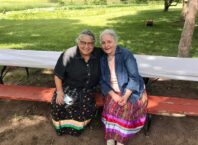It was the vision of two Native women, Lillian Rice and Chris Wallen, which lead to the creation of Minnesota Indian Women's Resource Center's new treatment program Nokomis Endaad-Shki Bimaadzi Mikaana (Grandmother's House-road To New Life).
Nokomis Endaad is an intensive outpatient treatment program that is culturally intrinsic and seeks to help Native women to heal from sexual trauma, addictions, mental health issues and cultural co-occurring disorders such as loss of culture, language, grief, and shame through traditional Native teachings and medicine, alongside western models of treatment programs.
Over eighteen years ago, Rice and Wallin endured hardships when they moved from their homes on the reservations to the urban community and eventually found support and healing through their traditional practices and sacred medicines. Through their journey they developed a desire to help other women going through similar obstacles and challenges.
Nokomis Endaad is an intensive outpatient treatment program that is culturally intrinsic and seeks to help Native women to heal from sexual trauma, addictions, mental health issues and cultural co-occurring disorders such as loss of culture, language, grief, and shame through traditional Native teachings and medicine, alongside western models of treatment programs.
Over eighteen years ago, Rice and Wallin endured hardships when they moved from their homes on the reservations to the urban community and eventually found support and healing through their traditional practices and sacred medicines. Through their journey they developed a desire to help other women going through similar obstacles and challenges.
Each had a passion for helping other women through cultural practices and soon became leaders in the community. They recognized a need for a treatment-centered approach to healing from the trauma and abuses of reservation and urban life. Rice and Wallin turned to Suzanne Koepplinger, Executive Director of Minnesota Indian Women's Resource Center (MIWRC), with their idea.
The creation of this unique treatment program took a year and a half of research, finding funding, licenses and hiring staff. Dr. Rosemary White Shield (Anishinabe) is the Treatment Director of Nokomis Endaad and led much of the research for the program by conducting sharing circles, both in Minnesota and surrounding communities, speaking to women that would be potential clients to find what it was that they wanted and needed.
Out of this research, Dr. White Shield discovered that Indian women face the highest rates of sexual violence of any group in the United States and one out of three Native women will be raped in their lifetime. Additionally, further research revealed that victims of sexual trauma use drugs and alcohol as coping methods and that these abuses are a result of cultural oppression and historical trauma.
A participant in one of the sharing circles reinforced these discoveries when she said, "There is a need for Native women to focus on healing their spirit which is at the core of their sense of self as being an Indian woman. We are the foundation of the family, and we have responsibilities that go with the role of life giver, teacher, nurturer and healer. These things can only be given when you spirit is regained, sustained, and nurtured. With these qualities intact inside ones self, then hope can be given to the children."
The mission for Nokomis Endaad became clear, which was narrowed down to, "What's bigger than addiction, grief, historical trauma, loss, illness? What's bigger than that are our spiritual and cultural strengths that have sustained and healed our ancestors for thousands of years and continue to do so today. Our role is to reattach clients to those cultural and spiritual strengths through ceremony and culturally based therapeutic approaches and interventions," Dr. White Shield said.
Thus, Nokomis Endaad is a response to the need for healing from both historical and sexual trauma by reattaching Native women back to their traditional ways and fostering a supportive environment and culturally based treatment.
This innovative program is the first of its kind in the country because of its focus on traditional Native healing practices, medicines, and teachings as well as its client centered approach to treatment.
Dr. White Shield explained how the program is client centered because it is, "based on client need, strength, and direction. We view that every client has her own spirit that leads her on her own sacred journey of healing like a compass, and if she listens she can help others support her in the way she needs to be lead to healing."
Clients have access to elders and medicine people, as well as Native languages, traditional art therapy, and Native women's teachings that are all tribal specific. These are combined with western medical practices that include drug and alcohol education, individual and/or group counseling, family therapy, equine therapy, and movement and exercise therapy.
The program structure consists of two Phases that are a total of 17 weeks of outpatient treatment, in which the clients co-create their own treatment plan. Phase I is an intensive eight-week program with 25 hours of treament weekly and Phase II is nine weeks with 16 hours of treatment weekly. After the initial two phases comes recovery maintenance and transitional care with long term support that can continue for up to a year.
Nokomis Endaad is housed within MIWRC with a staff that includes a licensed drug and alcohol counselor, counselor supervisor, a mental health professional and a full time elder in residence available to clients, to name a few of the people that assist in the program.
MIWRC and the staff of Nokomis Endaad opened on December 13, 2010. Clients have been admitted and the program is in full swing. Nokomis Endaad is looking to reach out and help any and all Native women who seek it.
Dr. White Shield said of the program's priority, "We put the client first, that is our whole focus and we consider it an honor and a privilege to be able to help our clients and serve them. What we do we do from the heart and that is our first and only reason. We are here for the client."
The creation of this unique treatment program took a year and a half of research, finding funding, licenses and hiring staff. Dr. Rosemary White Shield (Anishinabe) is the Treatment Director of Nokomis Endaad and led much of the research for the program by conducting sharing circles, both in Minnesota and surrounding communities, speaking to women that would be potential clients to find what it was that they wanted and needed.
Out of this research, Dr. White Shield discovered that Indian women face the highest rates of sexual violence of any group in the United States and one out of three Native women will be raped in their lifetime. Additionally, further research revealed that victims of sexual trauma use drugs and alcohol as coping methods and that these abuses are a result of cultural oppression and historical trauma.
A participant in one of the sharing circles reinforced these discoveries when she said, "There is a need for Native women to focus on healing their spirit which is at the core of their sense of self as being an Indian woman. We are the foundation of the family, and we have responsibilities that go with the role of life giver, teacher, nurturer and healer. These things can only be given when you spirit is regained, sustained, and nurtured. With these qualities intact inside ones self, then hope can be given to the children."
The mission for Nokomis Endaad became clear, which was narrowed down to, "What's bigger than addiction, grief, historical trauma, loss, illness? What's bigger than that are our spiritual and cultural strengths that have sustained and healed our ancestors for thousands of years and continue to do so today. Our role is to reattach clients to those cultural and spiritual strengths through ceremony and culturally based therapeutic approaches and interventions," Dr. White Shield said.
Thus, Nokomis Endaad is a response to the need for healing from both historical and sexual trauma by reattaching Native women back to their traditional ways and fostering a supportive environment and culturally based treatment.
This innovative program is the first of its kind in the country because of its focus on traditional Native healing practices, medicines, and teachings as well as its client centered approach to treatment.
Dr. White Shield explained how the program is client centered because it is, "based on client need, strength, and direction. We view that every client has her own spirit that leads her on her own sacred journey of healing like a compass, and if she listens she can help others support her in the way she needs to be lead to healing."
Clients have access to elders and medicine people, as well as Native languages, traditional art therapy, and Native women's teachings that are all tribal specific. These are combined with western medical practices that include drug and alcohol education, individual and/or group counseling, family therapy, equine therapy, and movement and exercise therapy.
The program structure consists of two Phases that are a total of 17 weeks of outpatient treatment, in which the clients co-create their own treatment plan. Phase I is an intensive eight-week program with 25 hours of treament weekly and Phase II is nine weeks with 16 hours of treatment weekly. After the initial two phases comes recovery maintenance and transitional care with long term support that can continue for up to a year.
Nokomis Endaad is housed within MIWRC with a staff that includes a licensed drug and alcohol counselor, counselor supervisor, a mental health professional and a full time elder in residence available to clients, to name a few of the people that assist in the program.
MIWRC and the staff of Nokomis Endaad opened on December 13, 2010. Clients have been admitted and the program is in full swing. Nokomis Endaad is looking to reach out and help any and all Native women who seek it.
Dr. White Shield said of the program's priority, "We put the client first, that is our whole focus and we consider it an honor and a privilege to be able to help our clients and serve them. What we do we do from the heart and that is our first and only reason. We are here for the client."






